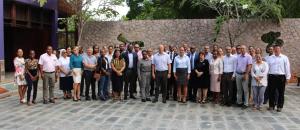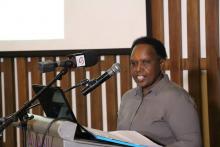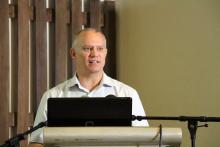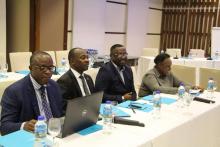Seychelles takes the lead as the first country in the African Region to adapt and validate the WHO/AFRO’s 3rd Edition Integrated Diseases Surveillance and Response (IDSR) Technical Guidelines
Seychelles, 30th August 2019 - Every year, countries in the African Region report over 100 infectious disease outbreaks and other public health emergencies. The frequency and magnitude of outbreaks in the region continues to increase and no country including the Seychelles is spared from these risks. Effective implementation of Integrated Diseases Surveillance and Response (IDSR) strategy is key to countries’ preparedness and response as it provides for strengthening of national public health surveillance and response systems at all levels; the community, health facility, district and national level.
Only days after the African Ministers of Health adopted the Regional Strategy for Integrated Diseases Surveillance and Response 2020 – 2030 during the 69th Regional Committee for Africa in Brazzaville, Congo, the Ministry of Health hosted a working session at the Avani Seychelles Resort and Spa to validate the Seychelles adapted 3rd Edition IDSR Technical Guidelines (TG). The 3rd Edition IDSR TG is the latest updated by WHO AFRO and partners from the second edition published in 2010. The Validation Meeting held on 29th August followed an earlier Adaptation Workshop by local experts to extensively review the generic WHO AFRO 3rd Edition IDSR TG to ensure that the document is contextualized to the local situation in the Seychelles. The Validation Meeting brought together key stakeholders at the country level notably IDSR national focal persons, IHR focal person, epidemiologists, laboratory personnel, technical staff in other vertical programs such as Immunisation and HIV/AIDS as well as other partners such as line Ministries, Department of Risk and Disaster Management, and the Seychelles Red Cross. The meeting including the adaption workshop were technically supported by experts from WHO AFRO - Dr. Emmanuel Musa, Dr. Lubambo Demba and Dr. Emmanuel Dzotsi.
Speaking at the opening of the Validation Meeting, His Excellency, Minister of Health Jean-Paul Adam said “I am proud that Seychelles is the first WHO member state to engage in the process of adaptation of the third edition of the IDSR technical guideline to our local context. We are lucky because we have partners that are responsive to us. We have WHO that has listened carefully to our needs and they have responded to support us in this process. We are also lucky because we are determined and because we have made conscious choices to move forward with this programme”.
The Minister reiterated the government’s commitment to diseases surveillance and response and reminded participants of the challenges the country faced in 2017 around the issue of the Plague which affected a neighboring country, Madagascar. He encouraged his team and key partners to continue to work in close collaboration to ensure the country’s response is as successful to any future events. Minister Adam informed delegates that the adaptation of the Technical Guideline is in line with the Small Island Developing States (SIDS) Strategic Plan agreed by the Health Ministers in 2017 and remains essential for a small island country like Seychelles to protect itself whilst working to achieve the Sustainable Development Goals. He thanked WHO for being responsive and being diligent in supporting the country to embark on the process.
In her address, the WHO Representative for Seychelles, Dr. Teniin Gakuruh conveyed the WHO Director General Dr. Tedros Ghebreyesus’ and Regional Director for Africa Dr. Matshidiso Moeti’ commendations for this critical milestone and assurance of WHO support for achievement of set targets.
“This is a major milestone for the Region. Seychelles is making a mark. I commend the Ministry of Health for being number one in the Region to adapt and validate the 3rd Edition IDSR Guideline after the 69th Regional Committee Meeting. I am also confident that the country will also do well in the full national roll out of the guidelines… The scope of this work is huge. It tells you what it takes to protect the country. This is just the beginning of a very long and yet doable target for the country. Hence the reason why I am emphasizing the need to remain committed as we have been so far” Dr. Gakuruh said.
The WR also reminded all present that the adaptation and roll out of the 3rd Edition IDSR Technical guideline is in line with what the Member States agreed to when the Regional Strategy for Health Security and Emergencies 2016–2020 was launched in 2016. Based on this strategy all member states commits to work towards implementation of IDSR with over 90% national coverage by 2020. Dr. Gakuruh indicated that with the high level commitment apparent so far with this process, she is confident that the country can meet this target.
To note, in Brazzaville, Congo last week member states unanimously adopted the more recent Regional Strategy for Integrated Diseases Surveillance and Response 2020 – 2030 at the 69th Regional Committee for Africa meeting. After 20 years of implementing IDSR, this comprehensive, evidence-based approach builds on the 2016 Strategy to better respond to current context and conditions in the African region including the increasing recognition of the threat epidemics pose to global health security. This latest 10-year strategy aims to strengthen national capacity for early detection, reporting, and analysis of IDSR priority diseases, strengthen national and supranational laboratory capacity to confirm these diseases, and strengthen capacity for public health emergency preparedness and response at all levels. It emphasizes the inter-linkages within the IDSR as an integral part of health systems strengthening to achieve universal health coverage (UHC). Furthermore, with WHO’s and other partners’ technical support, all member states including the Seychelles are expected to take ownership and leadership towards achieving the milestones and targets in the Regional Strategy by 2030. Member states’ commitment to this Strategy will contribute to the WHO’s Thirteenth General Programme of Work, 2019–2023 (GPW 13) and the triple billion goal of “one billion more people benefiting from universal health coverage, one billion more people protected from health emergencies and one billion more people enjoying better health and well-being.
With the generic IDSR technical guideline now adapted to the Seychelles context and validated, the three WHO experts; Dr. Musa, Dr. Demba and Dr. Dzotsi will next week facilitate a week-long Training- of- Trainers (ToT) on the adapted and validated 3rd Edition IDSR to key professionals in the public and private sector. For effective roll-out of the IDSR in Seychelles, the ToT will be followed by cascade IDSR training of health workers at all levels of the health system.






